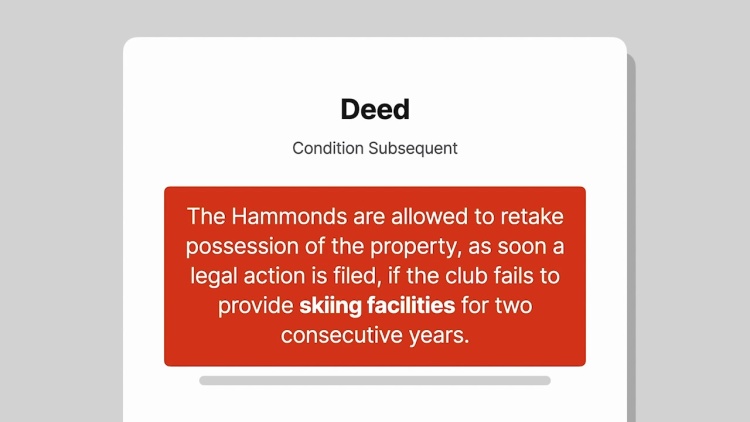Red Hill Outing Club v. Hammond
Supreme Court of New Hampshire
722 A.2d 501 (1998)
- Written by Patrick Busch, JD
Facts
In 1956, the Hammonds (defendants) purchased land in Moultonboro, New Hampshire. They developed the land for use as a ski slope, and were involved in forming Red Hill Outing Club (plaintiff), which was devoted to operating the ski slope. The club leased the slope from 1969 through 1979. It operated a rope tow and provided free ski lessons for its members and residents of the town. In 1979, the Hammonds conveyed the land to the club for nominal consideration. The deed contained the condition that the Hammonds could reenter and take possession of the land if, for two consecutive years, the club did not maintain the property as a ski slope and make it available to Moultonboro residents as a ski slope. The club stopped providing free ski lessons after 1989, and did not operate the rope tow for the winters of 1992-93 and 1993-94. The ski slope was completely closed during the second winter. The Hammonds filed a notice of reentry in October 1994, on the ground that the club had breached the condition by failing to operate skiing facilities for two consecutive years. The club then sought a declaratory judgment against the Hammonds. The trial court held that the condition subsequent in the deed should be strictly construed. Therefore, the trial court held, the only condition was that the club “maintain and make available the premises . . . as a ski slope.” Accordingly, the club had not breached during the winter of 1992-93, and the closure during the winter of 1993-94 was not long enough to give the Hammonds a right of reentry. The trial court held that the club retained title to the property. The Hammonds then appealed.
Rule of Law
Issue
Holding and Reasoning (Horton, J.)
What to do next…
Here's why 907,000 law students have relied on our case briefs:
- Written by law professors and practitioners, not other law students. 47,100 briefs, keyed to 996 casebooks. Top-notch customer support.
- The right amount of information, includes the facts, issues, rule of law, holding and reasoning, and any concurrences and dissents.
- Access in your classes, works on your mobile and tablet. Massive library of related video lessons and high quality multiple-choice questions.
- Easy to use, uniform format for every case brief. Written in plain English, not in legalese. Our briefs summarize and simplify; they don’t just repeat the court’s language.





